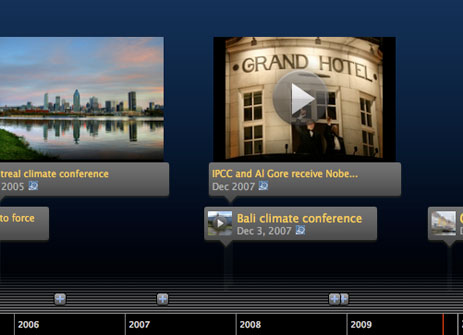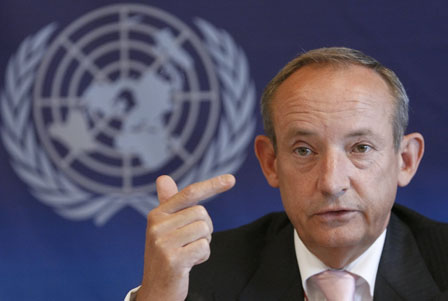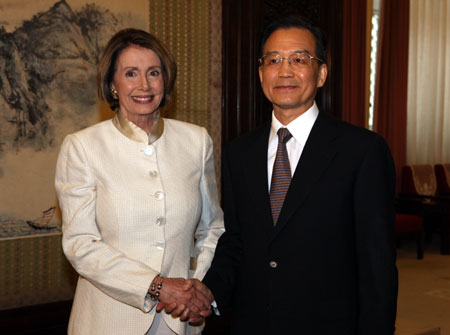UN climate summit
-
Climate talks timeline: From 350 to Kyoto to Copenhagen and beyond
Whether you’ve been hitting snooze each time a global climate conference rolls around or you’re looking for a refresher before the Copenhagen climate talks coming up, Grist has an interactive timeline to bring you up to speed. And don’t forget to keep tabs on all our juicy coverage of the Copenhagen climate talks. The road […]
-
The Copenhagen Conference on food security
For the 193 national delegations gathering in Copenhagen for the U.N. Climate Change Conference in December, the reasons for concern about climate change vary widely. For delegations from low-lying island countries, the principal concern is rising sea level. For countries in southern Europe, climate change means less rainfall and more drought. For countries of East […]
-
Oct 24, 2009 – Not just a global day of action; a historic turning point
Sarah Rifaat via 350.org Flickr Creative CommonsIf you’re still looking for a good reason to venture out and take part in an International Day of Climate Action event on Saturday, try this on for size: the day of action won’t simply be a landmark moment for the global climate movement; it could very well turn […]
-
A scary new climate study will have you saying ‘Oh, shit!’
“Oh, shit.”They say that everyone who finally gets it about climate change has an “Oh, shit” moment — an instant when the full scientific implications become clear and they suddenly realize what a horrifically dangerous situation humanity has created for itself. Listening to the speeches, ground-breaking in their way, that President Obama and Chinese President […]
-
Greg Craven’s new book retools the climate debate
In his speech at the U.N. Summit on Climate Change today, President Barack Obama admonished world leaders that their nations “cannot allow the old divisions that have characterized the climate debate for so many years to block our progress.” Yet, during this week-long summit to lay the groundwork for the Climate Change Conference in Copenhagen […]
-
Yvo de Boer of U.N. climate convention says 350 ppm is pipe dream
“I don’t think there is a hope in hell that people will agree to 350 in Copenhagen. I think we’ll get 2 degrees.” — Yvo de Boer, executive secretary of the United Nations Framework Convention on Climate Change, speaking at a recent meeting with NGO officials. “350” refers to the goal of reducing the concentration […]
-
Congressional leaders head to China to make nice on climate
House Speaker Nancy Pelosi and Chinese Premier Wen Jiabao.XinhuaHouse Speaker Nancy Pelosi is in China this week leading a congressional delegation to discuss, among other things, climate change and environmental protections. But despite the public displays of unity on climate, there remain some strong divisions between the two countries on what needs to happen in […]
-
Washington new center of global warming battle
WASHINGTON — European ministers are flocking to Washington drawn by the new administration’s pledge to help lead the fight against climate change, an issue largely put on ice for eight years here. Ministers from across Europe as well as Canada are taking part in a whirl of meetings here this week to gauge prospects of […]
-
Gore urges Congress to quickly pass stimulus package and climate bill

Speaking before the Senate Foreign Relations Committee on Wednesday, VP-turned-climate-guru Al Gore urged lawmakers to move quickly on both the economic-stimulus package and a cap-and-trade climate bill. His testimony -- which included an updated version of his Inconvenient Truth slide show, now with even scarier data -- was warmly received by Republicans as well as Democrats.
"I urge this Congress to quickly pass the entirety of President Obama's recovery package," Gore said. "The plan's unprecedented and critical investments in four key areas -- energy efficiency, renewables, a unified national energy grid, and the move to clean cars -- represent an important down payment and are long overdue." He said he favors the House version of the bill (passed Wednesday afternoon), which includes more funding for efficiency, renewable energy, and mass transit.
This was the first major hearing of the 111th Congress for the Foreign Relations Committee, whose new chair is Sen. John Kerry (D-Mass.). By shining a spotlight on Gore and climate change at the hearing, Kerry sent a clear message about his priorities.
"Frankly, the science is screaming at us," Kerry said. He cited a recent study from the University of Pennsylvania, MIT, and the Heinz Center that found that even if the world aims for the highest goals currently on the table -- including Obama's call for an 80 percent reduction in greenhouse-gas emissions from 1990 levels by 2050 -- carbon dioxide in the atmosphere would still far exceed safe levels. "If every nation were to make good on its existing promises, we would still see atmospheric carbon dioxide levels well above 600 parts per million -- 50 percent above where we are now. ... And no one in the scientific community disputes that this would be catastrophic."
"Some may argue that we cannot afford to address this issue in the midst of an economic crisis," Kerry continued. "Those who pose that question have it fundamentally wrong. This is a moment of enormous opportunity for new technology, new jobs, and the greening and transformation of our economy."
Gore echoed that point, emphasizing that we can't wait to act on climate change, which is intertwined with other key national challenges. "We must face up to this urgent and unprecedented threat to the existence of our civilization at a time when our country must simultaneously solve two other worsening crises. Our economy is in its deepest recession since the 1930s. And our national security is endangered by a vicious terrorist network and the complex challenge of ending the war in Iraq honorably while winning the military and political struggle in Afghanistan," said Gore. "As we search for solutions to all three of these challenges, it is becoming clearer that they are linked by a common thread -- our dangerous over-reliance on carbon-based fuels."





